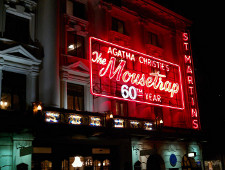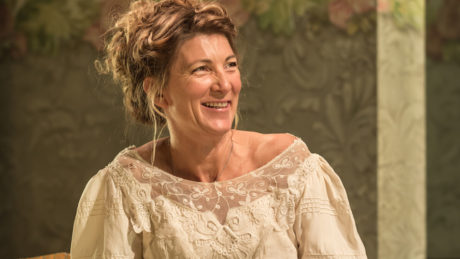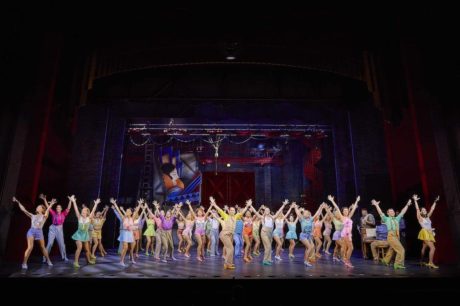A few weeks ago I found myself hankering to have a look at the London theater season, so I spent a day in the friendly skies of United Airlines to spend a week in which our own NY scene was fairly quiet.
Once I was settled, I chose a very old hit, a very new one, a revival of Oscar Wilde’s A Woman of No Importance (which I didn’t know well), and the American smash musical 42nd Street, which is currently playing at the Drury Lane in Covent Garden. I wanted to include the recent revival of Follies, for its cast included Imelda Staunton, a great favorite of mine, but none of my London contacts could come up with tickets for it. More about that later.
The Mousetrap came up first. Agatha Christie’s thriller opened 64 years ago, and has been playing eight shows a week ever since! When I first arrived in London in 1960 it was doing very nicely at the Ambassadors Theatre with a cast that included Richard Attenborough as the young lead. I’ve always avoided it, for it sounded to me like a summer stock touring production of an “audience play,” and I was always looking for the new and the now. So what a joy it was to find it fresh as a daisy, with a cast of eight that joined it recently as the 2017 batch.

It moved years ago, next door to the Ambassadors at the splendidly refurbished St Martin’s Theatre. The management wisely replaces everyone every year, and I can only say that this year’s crop is top notch. A beautifully constructed mystery that begins just AFTER a murder has been committed, and the play concerns itself with “who might be next.” I won’t give any spoilers, but there are twists and turns that kept me fascinated, and no one is more surprised than I when I say, don’t let its age discourage you. Dame Agatha Christie has written a play that remains young at heart, cleverly plotted, and performed with just the right amount of esprit one would want and expect; a war horse that knows it’s a winner and plays with its head held high.
The Vaudeville Theatre sits on the Strand just doors away from my digs at the Strand Palace Hotel; and its front-of-house photos from its current offering, Oscar Wilde’s A Woman of No Importance, looked so intriguing, I took a chance. Eve Best and Anne Reid are featured with Eleanor Bron and other stage favorites from the London scene, but I did not know them, and once again, I was floored by the star quality all of them displayed in this deliciously witty and very wise play, which shows Wilde’s keen understanding of the complexity in his characters. Language is his instrument, and this play is as full of epigrams and one-liners, as is his more frivolous comedy The Importance of Being Earnest, but it probes more deeply. It causes us to laugh out loud and then to brush away a tear or two as well.

Though Wilde was Irish and liked to remind people of it, he understood high society in England better than most natives, and this stylishly mounted and beautifully costumed comedy at the Vaudeville is as revealing as anything the Actors Studio in America used to present in its “kitchen sink” dramas in New York from the pens of Arthur Miller, Paddy Chayefsky, and Clifford Odets. The delicious artificiality of the language and the acting style were exactly what Lee Strasberg and his cohorts at the Actors Studio were revolting against. Happily, both methods have survived, and this woman of no importance is attracting a vast audience that still embraces the old approach when it so devilishly well delivers, as it does here.
The next night, for a change of pace, I opted for the lavishly mounted 42nd Street, a very fresh look at the surprise smash hit which marked Gower Champion’s final gift to Broadway as choreographer/director, on the opening night of which in 1980, he passed away. David Merrick, whose career as the leading producer among his then-current crop of colleagues managed to exploit even that sad event, and 42nd Street logged up a run of four years in its official New York run. The current London revival at the Theatre Royal, Drury Lane is an astonishing extravaganza employing 60 performers to bring the house down with several rousing tap routines that begin impressively, then top themselves, each and every one, so the evening has at least four show- stoppers.

Again, a cast largely unfamiliar to me is astounding from leading man to one line crossover. Tom Lister as Julian Marsh (originated in New York by Jerry Orbach), is a powerful leading man with equal talents as actor and singer. Clare Halse as Peggy Sawyer, the young lady from Allentown, who wants desperately to be in Pretty Lady (the show within a show that 42nd Street is all about) is personable. In another era, she’d have been lured away to Hollywood where she would have been “another Debbie Reynolds.” I don’t mean to imply she’s a copy of anyone; she’s original and fresh and she could easily play romantic leads in the kinds of films we used to like. Sheena Easton as the star of Pretty Lady, is hilarious and powerful and sings her big numbers superbly, bringing the delightful Rosalind Russell to mind, but Ms. Easton can not only act the role, she can sing it triumphantly.
Of course, the score is loaded with winners, and a dozen principals each get to take the stage and delight with the hummingly engaging work of composer-lyricist Harry Warren and Al Dubin. The score offers everything from “I Only Have Eyes For You” to “We’re In The Money,” “Lullaby of Broadway,” “About a Quarter To Nine,” and the title tune itself. Though they have been treated freshly with new viewpoints, it doesn’t hurt if you happen to remember what Dick Powell, Ruby Keeler, Bebe Daniels, and Warner Baxter did with them in the early 1933 film.
Not only are musical numbers staged extravagantly by Mark Bramble and Randy Skinner, but they are tapped in dazzling sets and costumes designed by Douglas Schmidt and Roger Kirk with ample assistance from the entire production team. It’s what “musical comedy” was, and could be again, but musical theater is on a different path now, and we may have to wait a generation or two to get back to the simple pleasures of the golden age. What impressed me most about the audience was the number of teenagers and young adults who were dotted among the sold-out crowd. One last kudo: the story is clearly as New York-flavored as Guys and Dolls and Funny Girl, and this predominantly British cast managed the accents and attitudes down to the “cuppa cawfees” and the sort of dialogue that still gets to us, lines like, “A hundred lives are depending on you. You have to go out there a kid from Allentown, and come back a star!”
I recommend this 42nd Street to men, women, children, and anyone in between who agrees with Producer Jordan Marsh that the two most glorious words in the English language are “musical comedy.” See this show if you can, and you’ll understand why.
What we thought would be our last night at the theater was Ink, a highly respected and genuine hit drama. Again, word of mouth was all I had to go on, as James Graham and Robert Goold (playwright and director) were not household names to me. The custom has been in America that when doing an expensive production of a play dealing with politics or celebrity biography or professions like the law, the box office names of Arthur Miller or David Mamet or Tony Kushner would have to be coupled with a major name director and a film or television star to ensure big box office. Fredric March in Inherit the Wind or Long Day’s Journey into Night, Helen Hayes in Victoria Regina, Raymond Massey in Abe Lincoln in Illinois. But at the Duke of York’s, we have a play about Rupert Murdoch with an ensemble cast and staff of excellent theater stalwarts whose names are not universally known. The play deals with Murdoch’s purchase of The Sun, a morning paper, then turning into a proper rival and eventual successor to The Mail. The two daily papers were arch rivals, and the battle was on.
This play, this Ink, is a huge play with dozens of characters played by some 13 actors who appear on a giant set which moves up, down, and sideways, accompanied by choreography, projections, sounds, and original music. It must have cost a billion pounds to produce. To me it seemed far more parochial, suited to the native British audiences who have been flocking to see it. I think it would have the same fate on Broadway as ENRON which was another English success that didn’t register with audiences here. It’s almost three hours long, and though Bertie Carvel did excellent work as the cruel school mistress in Matilda the Musical, he is here unrecognizable as Murdoch, and frankly less interesting as this male mogul in the making. I couldn’t get with it, and I tried, because it was a mammoth effort on behalf of all. My opinion won’t matter at all in the final outcome of the show’s run in England, but I don’t see it working over here. To me, it is more about production than character. In that regard it resembles The Curious Incident of the Dog in the Night-Time, but only scenically. That other British import worked so well here because the boy at the center of all the projections and lighting was a character with whom we empathized totally.
So there we are. I had a nourishing and varied week of fine work in London’s West End, which seemed to be booming with local audiences as well as tourists from all over the world. Live theater is alive and well in London as it is in New York, despite the threats and occasional incidents that are devastating. There seemed to be little or no evidence of fear or tentativeness, and I heartily recommend a visit to the many gems on display this season. Follies at the National Theatre gets my full attention in a separate column.
The Mousetrap
Running Time: 2 hours 20 minutes with one intermission.
The Mousetrap plays at St Martin’s Theatre in London in an open-ended run. Purchase tickets online.
A Woman of No Importance
Running Time: 2 hours 30 minutes with one intermission.
A Woman of No Importance is currently booking through December 30, 2017, and plays at the Vaudeville Theatre, London. Purchase tickets online.
42nd Street
Running Time: 2 hours 40 minutes with one intermission
42nd Street plays at the Theatre Royal, Drury Lane. Purchase tickets online.
Ink
Running Time: 2 hours 50 minutes with one intermission.
Ink plays at the Duke of York’s Theatre, London. Purchase tickets online.




